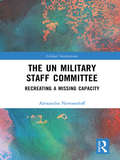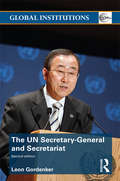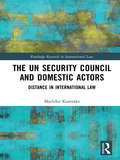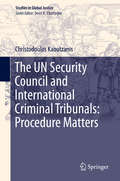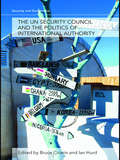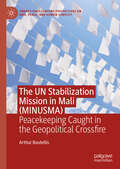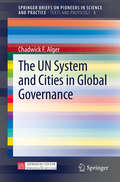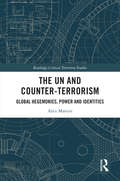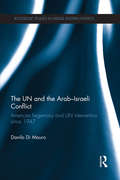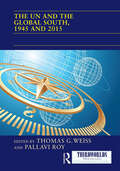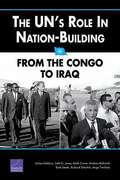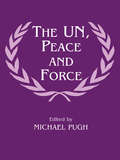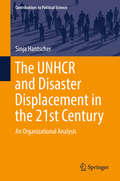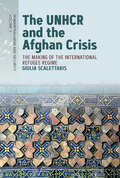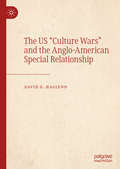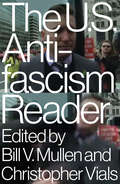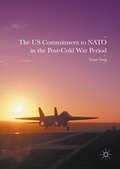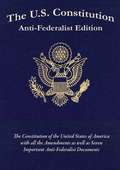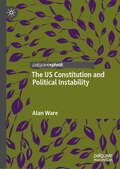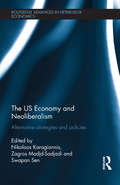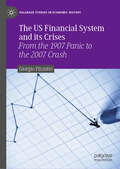- Table View
- List View
The UN Military Staff Committee: Recreating a Missing Capacity (Global Institutions)
by Alexandra NovosseloffThe UN Military Staff Committee is a misunderstood organ, and never really worked as it was initially envisaged. This book charts its historic development as a means to explain the continuous debate about the reactivation of the Military Staff Committee and, more generally, the unsatisfied need for the Security Council to have a military advisory body so that it does not only depend on the Secretariat to make its decisions on military and security affairs. The author takes a clear stand for the establishment of a military committee with real weight in the decision-making process of the Security Council related to peace operations. The Security Council remains the only international body making decisions in peace and security, authorizing military deployment without advice from a collective body of military experts and advisers. Recreating such a body is the missing part of all UN reform structures undertaken in past years. As the number of UN troops deployed increases, this book will be an important read for all students and scholars of international organisations, security studies and international relations.
The UN Secretariat�s Influence on the Evolution of Peacekeeping
by Silke WeinlichUsing a unique analytical framework, the UN Secretariat's Influence on the Evolution of Peacekeeping reveals deep insights in the UN's peacekeeping decision-making and shows that even international bureaucracies with limited autonomy can shape international politics.
The UN Secretary-General and Secretariat (Global Institutions)
by Leon GordenkerThe new edition of this accessible introduction to the important role of the United Nations Secretary-General continues to offer a keen insight into the United Nations – the Secretariat and its head, the Secretary-General, summing up the history, structure, strengths and weaknesses, and continuing operations of an ever-present global institution. Behind the public face of the Secretary-General, Ban Ki-moon and his predecessors, an active corps of officials and advisers face ceaseless pressures and challenges. This clear and concise introduction examines both the solid and substantive work of the UN’s permanent staff and the role of the Secretary-General in policy development. The 2nd edition has been thoroughly revised and updated to reflect: the retirement of Kofi Annan and the appointment of Ban Ki-moon as the new UN Secretary General the withdrawal of John Bolton as permanent representative of the United States and the consequent softening of the approach of his government to the UN developments in the global economy and international security dilemmas the change of administration in the United States. Written by a recognized authority on the subject, this book continues to be the ideal interpretative introduction for students of the UN, international organizations and global governance.
The UN Security Council and Domestic Actors: Distance in international law (Routledge Research in International Law)
by Machiko KanetakeThis book analyses the exercise of authority by the UN Security Council and its subsidiary organs over individuals. The UN Security Council was created in 1945 as an outcome of World War II under the predominant assumption that it exercises its authority against states. Under this assumption, the UN Security Council and those individuals were ‘distanced’ by the presence of member states that intermediate between the Security Council’s international commands and those individuals that are subject to member states’ domestic law. However, in practice, the UN Security Council’s exercise of authority has incrementally removed the presence of state intermediaries and reduced the Security Council’s distance to individuals. This book demonstrates that this phenomenon has increased the relevance of domestic law in developing the international normative frameworks governing the UN Security Council and its subsidiary organs in safeguarding the rights, obligations, and interests of those affected individuals. This book presents how the UN Security Council’s exercise of authority has been received at the domestic level, and what would be the international implications of the Security Council’s extensive encounter with the actors who primarily reside in a domestic legal order.
The UN Security Council and International Criminal Tribunals: Procedure Matters (Studies in Global Justice #20)
by Christodoulos KaoutzanisThe book explains why and how the UN Security Council authorizes international criminal investigations into mass atrocities. In doing so, it tackles head-on the obvious double standards of global justice, where few atrocities get investigated and most slip below the headlines. The book argues that the Council’s decision-making procedure is central to understanding the Council’s decisions. This procedure is broken into three distinct steps, namely the role of diplomats at the Council, the Council’s reliance on third parties and the Council’s resort to precedent. The volume documents that the Council authorized international criminal investigations only into the handful of mass atrocities for which the Council’s deliberations successfully completed each of these three steps. Written for both scholars and practitioners, the book combines insights from the fields of international relations, international law and human rights. Through archival research and interviews with UNSC diplomats who took part in deliberations on atrocities, the volume presents evidence that supports its argument across cases and across time. In doing so, the book avoids the yes/no (or 0 vs 1) tendency of many social science projects, thereby acknowledging that there is no silver bullet to explain the work of the Council’s five permanent and ten elected members. Chris Kaoutzanis's Procedure Matters is a deep dive into how the UN Security Council actually works in dealing with some of the world's worst atrocities. Showing that UN procedure does matter, Kaoutzanis illuminates the limited accountability for international crimes that can be expected from that vital institution. As importantly, he offers a road map for how to use UN legitimating procedures to navigate the power politics of that august body. This is a map no scholar of international institutions and no human rights activist should be without. Michael Doyle, Columbia University This project recognizes what the scholarly literature has generally ignored or deemphasized: the central role of the Security Council in responding to mass atrocity situations. As much as international lawyers would hate to admit it, the legal response to international crimes is initially controlled not by international judges and tribunals, but rather by the Security Council and its geo-political and diplomatic complications. Kaoutzanis has put the sun back at the center of our solar system. Jens David Ohlin, Cornell Law School
The UN Security Council and the Politics of International Authority (Security and Governance)
by Ian Hurd Bruce CroninObserves how the growth of the political authority of the Council challenges the basic idea that states have legal autonomy over their domestic affairs. The individual essays survey the implications that flow from these developments in the crucial policy areas of: terrorism; economic sanctions; the prosecution of war crimes; human rights; humanitarian intervention; and the use of force. In each of these areas, the evidence shows a complex and fluid relation between state sovereignty, the power of the United Nations, and the politics of international legitimation. Demonstrating how world politics has come to accommodate the contradictory institutions of international authority and international anarchy, this book makes an important contribution to how we understand and study international organizations and international law. Written by leading experts in the field, this volume will be of strong interest to students and scholars of international relations, international organizations, international law and global governance.
The UN Stabilization Mission in Mali: Peacekeeping Caught in the Geopolitical Crossfire (Twenty-first Century Perspectives on War, Peace, and Human Conflict)
by Arthur BoutellisThe book tells (and analyzes) the story of the United Nations multidimensional stabilization operation in Mali (MINUSMA), which closed at the end of the 2023 after almost a decade of existence. MINUSMA, which is the UN operation that has by far attracted the most media attention, has been the laboratory of contemporary peacekeeping, combining several interesting elements. It came on the tail of a French-African military intervention (rehatting African contingents), operated ‘in parallel’ to various counterterrorism forces (Barkhane and JF G5 Sahel). It has been the deadliest peace operation due to asymmetric threats but has also managed to adapt to a new environment and has witnessed a ‘return’ of European troop contributors to peacekeeping in Africa but also a significant contribution from China. Most importantly, MINUSMA ultimately became caught in the geopolitical crossfire, with a host government led by a military junta and supported by Russia (and the Wagner Group) defying the Security Council, in the context of a return of East-West rivalries exacerbated by the 2022 Ukraine invasion.
The UN System and Cities in Global Governance
by Chadwick F. AlgerThis is the second volume to commemorate the 90th birthday of the distinguished scholar Chadwick F. Alger to honor his lifetime achievement in international relations and as President of the International Studies Association (1978-1979). After a brief introduction by Chad F. Alger this volume presents six of his key texts on The UN System and Cities in Global Governance, focusing on "Cities as arenas for participatory learning in global citizenship"; "The Impact of Cities on International Systems"; "Perceiving, Analysing and Coping With the Local-Global Nexus"; "The World Relations of Cities: Closing the Gap Between Social Science Paradigms and Everyday Human Experience"; "Japanese Municipal International Exchange and Cooperation in the Asia-Pacific: Opportunities and Challenges" and on "Searching for Democratic Potential in Emerging Global Governance: What Are the Implications of Regional and Global Involvements of Local Governments?".
The UN and Counter-Terrorism: Global Hegemonies, Power and Identities (Routledge Critical Terrorism Studies)
by Alice MartiniThis book traces the evolution of the UN Security Council’s actions against counter-terrorism and extremism. The work examines the progression of the UN Security Council’s fight against international terrorism and its development of practices to prevent radicalisation and extremism. It also looks at the consequences of these processes and how they have deeply moulded global counter-terrorism. The book looks at the discursive construction of a global threat and tracks how this construction evolved in relation to the Council’s establishment of legal practices and bodies, and by its Members’ discourses. It argues that the very specific definition the Council provided on international terrorism in the 2000s is profoundly shaped by global hegemonies, relations of power shaping the international community, and its own identity. To demonstrate this, it offers a long genealogical perspective of the structure of the UN since the 1930s and then focuses specifically on the developments taking place in the 2000s. The book thus looks at the Security Council’s fight against international terrorism as a global, globalised, and globalising enterprise. This book will be of much interest to students of critical terrorism studies, security studies, global governance and International Relations.
The UN and the Arab-Israeli Conflict: American Hegemony and UN Intervention since 1947 (Routledge Studies in Middle Eastern Politics)
by Danilo Di MauroThis book provides a comprehensive empirical analysis of the United Nations intervention in the Arab-Israeli conflict since 1947. In his structured and exhaustive analysis, the author presents a long term perspective on the UN intervention in the conflict and explains its evolution during the last sixty years. He draws on a wealth of quantitative data to provide a complete picture of resolutions addressed to the Arab-Israeli conflict by the General Assembly and the Security Council, the mediation activity, and the UN peace missions in the area. Through his analysis, Di Mauro addresses such questions as: Why did the United Nations have different involvement and efforts of interventions in the conflict? How did the role of the UN change during the dispute, and why did it change? Is there still a role for the UN in the Palestinian-Israeli peace process? Offering a contribution to both to the studies of UN intervention in conflict resolution and, more broadly, to the UN role in the international system, The UN and the Arab-Israeli Conflict will be of great interest to International Relation scholars and students, but also appreciable by historians, political scientists, methodologists and all the social scientists interested in the Palestine question and the United Nations.
The UN and the Global South, 1945 and 2015 (ISSN)
by Thomas G. Weiss Pallavi RoyThere is a woeful neglect of the current United Nations in the academic and policy literatures, and so it is unsurprising that an examination of that multilateral structure before 1945 shows an even more egregious absence of analytical attention. Such ignorance conveniently ignores the forgotten genius of 1942–1945, namely in the wide substantive and geographic relevance of multilateralism during the World War II and in the foundations for the contemporary world order. The wartime and immediate post-war United Nations was not simply dictated by the US State Department, Whitehall, and the foreign ministries of the West—even a generation before decolonisation had proceeded apace and two-thirds of UN member states moved into the limelight as erstwhile colonies. These essays interrogate the extent to which anti-colonialists and other nationalists resisting imperial rule embraced the promise of a rule-based world order as a normatively and operationally valuable projection in 1945. They critically review the worlds of 1945 and 2015, of then and now, to determine the role of continuity and change, of the continuing bases for compromise and for the clashes between the Global South and North. This book was previously published as a special issue of Third World Quarterly.
The UN's Role in Nation-Building: From the Congo to Iraq
by James Dobbins Keith Crane Andrew Rathmell Brett Steele Seth G. JonesReviews UN efforts to transform eight unstable countries into democratic, peaceful, and prosperous partners, and compares those missions with U.S. nation-building operations. The UN provides the most suitable institutional framework for nation-building missions that require fewer than 20,000 men-one with a comparatively low cost structure, a comparatively high success rate, and the greatest degree of international legitimacy.
The UN, Peace and Force
by Michael PughRestoring and maintaining peace within war-torn societies is a relatively new task for the United Nations. This book examines the options for the UN in the use of force to secure peace, and the extent to which peacekeeping can be effectively extended to coerce warring factions. A combination of internationally distinguished academics and new scholars at the forefront of research are represented, making an important contribution to the debate about the role of international military operations in the maintenance of international peace and security.
The UNHCR and Disaster Displacement in the 21st Century: An Organizational Analysis (Contributions to Political Science)
by Sinja HantscherThis book offers an in-depth case study on the leading international refugee agency, the United Nations High Commissioner for Refugees (UNHCR), and its approach to environmentally displaced persons. The author examines the UNHCR on the basis of expert interviews and content analysis in order to highlight why and how the organization is addressing the issue. The analysis draws on organizational as well as security theory, offering readers a better understanding of the connection between the two. The book appeals to scholars in the fields of migration and organizational studies, as well as policymakers and professionals working in international organizations.
The UNHCR and the Afghan Crisis: The Making of the International Refugee Regime (Humanitarianism and Security #3)
by Giulia ScalettarisToday the UNHCR is present in more than 130 countries and takes care of some 90 million people. This book looks at how it is deployed and who its agents are. By taking the reader through the offices in charge of the Afghan refugee crisis during the 2000s, in Geneva and in Kabul, the book shows the internal functioning of this international organization. It provides analysis of Afghan refugee policies from an original position, with the author being both agency official and anthropologist, and articulates multiple levels of analysis: the micropolitics of practices as much as the institution and the multi-scalar power relations that shape its environment.
The UNHCR and the Supervision of International Refugee Law
by James C. SimeonThe 1951 Convention relating to the Status of Refugees, and its 1967 Protocol, and many other important international instruments recognize the unique role the UNHCR plays in protecting refugees and supervising international refugee law. This in-depth analysis of the UNHCR's supervisory role in the international refugee protection regime examines the part played by key institutions, organizations and actors in the supervision of international refugee law. It provides suggestions and recommendations on how the UNHCR's supervisory role can be strengthened to ensure greater State Parties' compliance to their obligations under these international refugee rights treaties, and contributes to enhancing the international protection of refugees and to the promotion of a democratic global governance of the international refugee protection regime.
The US "Culture Wars" and the Anglo-American Special Relationship
by David G. HaglundThis book discusses “culture” and the origins of the Anglo-American special relationship (the AASR). The bitter dispute between ethnic groups in the US from 1914–17—a period of time characterized as the “culture wars”—laid the groundwork both for US intervention in the European balance of power in 1917 and for the creation of what would eventually become a lasting Anglo-American alliance. Specifically, the vigorous assault on English “civilization” launched by two large ethnic groups in America (the Irish-Americans and the German-Americans) had the unintended effect of causing America’s demographic majority at the time (the English-descended Americans) to regard the prospect of an Anglo-American alliance in an entirely new manner. The author contemplates why the Anglo-American “great rapprochement” of 1898 failed to generate the desired “Anglo-Saxon” alliance in Britain, and in so doing features theoretically informed inquiries into debates surrounding both the origins of the war in 1914 and the origins of the American intervention decision nearly three years later.
The US Antifascism Reader
by Bill V. Mullen Christopher VialsHow anti-fascism is as American as apple pieSince the birth of fascism in the 1920s, well before the global renaissance of &“white nationalism,&” the United States has been home to its own distinct fascist movements, some of which decisively influenced the course of US history. Yet long before &“antifa&” became a household word in the United States, they were met, time and again, by an equally deep antifascist current. Many on the left are unaware that the United States has a rich antifascist tradition, because it has rarely been discussed as such, nor has it been accessible in one place. This reader reconstructs the history of US antifascism into the twenty-first century, showing how generations of writers, organizers, and fighters spoke to each other over time. Spanning the 1930s to the present, this chronologically-arranged, primary source reader is made up of antifascist writings by Americans and by exiles in the US, some instantly recognizable, others long-forgotten. It also includes a sampling of influential writings from the US fascist, white nationalist, and proto-fascist traditions. Its contents, mostly written by people embedded in antifascist movements, include a number of pieces produced abroad that deeply influenced the US left. The collection thus places US antifascism in a global context.
The US Commitment to NATO in the Post-Cold War Period
by Yanan SongThis book examines the continuing US commitments to NATO in the post-Cold War era. The initial focus is on the recommitment decisions of the Clinton administration. It also extensively explores the US operations in Kosovo, Afghanistan and, in particular, Libya. The case study on Libya is especially important in exploring the Obama administration s understanding of the purpose of NATO in the context of current economic pressures, domestic US debates about post-War on Terror interventions, and of increasing American preoccupation with Pacific rather than European security. The author utilises substantial archival research and interviews with policymakers and academics, including Ambassador Kethleen Stephens, former Special Assistant to the President Stephen J. Flanagan, and former Director for Non-proliferation at National Security Council Robert S. Litwak. This book is ideal for postgraduate researchers and academics in US foreign policy, foreign policy decision-making, transatlantic relations and NATO, as well as a great use to undergraduate students. "
The US Congress for Kids: Over 200 Years of Lawmaking, Deal-Breaking, and Compromising, with 21 Activities
by Henry Waxman Ronald A. Reis Kristi NoemAn interactive guidebook to the history and inner workings of the legislative branch of the U.S. Government Providing a historical perspective on all that is going on today, US Congress for Kids examines the major milestones in congressional history, including the abolition of slavery, extending the vote to African Americans and to women, and investigating misconduct in both government and private institutions. Kids will be engaged by the focus on dramatic stories, personalities, and turning points while also benefitting from the clear discussions of Congressional purpose, structure, history, and ongoing issues. Educational, hands-on activities that illuminate the workings of the U.S. Congress include making a House ceremonial mace, creating congressional money, making a capitol dome, and designing a Congressional Medal of Honor.
The US Constitution Anti-Federalist Edition
by VariousCollected here in one volume is the United States Constitution, with all of the Amendments, and seven important Ant-Federalist papers by writers such as Patrick Henry, Samuel Adams, and George Clinton. The Anti-Federalists were opposed to a strong federal government. They were concerned that if too much power was given to the federal government, states' rights would necessarily be eroded.
The US Constitution and Political Instability
by Alan WareThis book examines sources of conflict and instability in the US. Especially since 2008 a predominant theme has been the role of opposed social cultures and values within America. However, the main causes of instability have become the institutional fragmentation of power. There are many ways in which policy initiatives can be blocked, delayed or weakened—by other levels of government or by separate institutions at the same level. Yet, only quite recently has the Constitution&’s role, widely believed earlier to be a bulwark of American democracy, started to become a weakness for it. This book argues not that the US Constitution is in imminent danger, but that the possibility of major failure, or of inaction in some policy areas, has increased greatly. The world after 1945, in which the American polity predominated, is one of its reduced power, with some rivals now having greater opportunities to frustrate US initiatives. Increased internal divisions have been crucial to its effectiveness both internally and in international arenas.
The US Constitution: A Pocket Reference
by Power Think PublishingThis is the most comprehensive "pocket" edition on the United States Constitution. This 96 page reference fits nicely in your pocket for quick, convenient access. <p><p> Contents Included in this Handy Pocket Reference: <p> The Complete Constitution of the United States - Preamble and 7 Articles - The Bill of Rights and All Other Amendments - In Convention Monday, Sept. 17th, 1787 (Presentation of the Constitution before Congress) - Congress of the United States Sept. 25, 1797 (The Presentation of the First 12 Amendments to the Legislatures) <p>A Brief History of the US Constitution - Introduction, Articles of Confederation, The Delegates, The Virginia Plan, The New Jersey Plan, Hamilton's Plan, <p>The Great Compromise, The First Draft, The Federalists & Anti-Federalists, Ratification, The Bill of Rights, The Document Enshrined. <p>The Declaration of Independence Questions and Answers Pertaining to the Constitution (over 80 Questions & Answers covering the key points of the Constitution) <p>Famous Quotes from the Founders
The US Economy and Neoliberalism: Alternative Strategies and Policies (Routledge Advances in Heterodox Economics)
by Nikolaos Karagiannis Zagros Madjd-Sadjadi Swapan SenIn recent times, policy makers, scientists, academics and commentators have become increasingly nervous about the US economic downturn. Discussions have centred around the range and magnitude of the country’s socio-economic problems, its vexing production decline and its unsatisfactory macroeconomic performance, which give rise to the following questions: what are the sources of this recent downfall? And can this situation be reversed by pursuing the same orthodox and neoliberal policies? This new edited volume, from a top international set of contributors, seeks to answer these questions and to offer alternative, realistic and feasible strategies and policy recommendations towards reversing this situation. In particular, the volume seeks to challenge US neoliberalism on theoretical and political grounds, and to offer alternative strategies and policies towards addressing the country’s recent challenges and multi-dimensional problems. The volume is structured around three main themes: The return of government: Philosophical issues and ethics Economic policies for sustainable growth and prosperity Financial fragility and alternative monetary policy proposals This unique and highly topical, multidisciplinary volume, will be of great interest to students and researchers in the areas of economics, political economy and contemporary US politics.
The US Financial System and its Crises: From the 1907 Panic to the 2007 Crash (Palgrave Studies in Economic History)
by Giorgio PizzuttoLooking at the precedents set by the panic of 1907 and the Great Depression in America, this book investigates the causes of the 2007-2008 financial crisis. Pizzutto examines the effects of monetary policy, as well as of expanding and contracting financial cycles, in order to analyze the breakdown of the money market and capital market circuits. Not only exploring the impact of the Federal Reserve and central banking on monetary policy, he also analyzes the role of non-bank financial intermediaries.How can monetary policy resolve the instability of the US financial system? How can financial intermediation work effectively? This timely book highlights how historical lessons can be used to avoid the next financial crisis.
